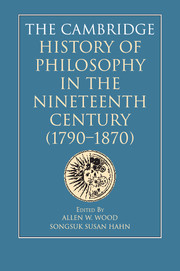Book contents
- Frontmatter
- Contents
- Contributors
- Preface
- Abbreviations
- Introduction
- I Philosophy in the Nineteenth Century
- II Logic and Mathematics
- III Nature
- IV Mind, Language, and Culture
- V Ethics
- VI Religion
- 16 Challenges to Religion in the Nineteenth Century
- 17 Three Types of Speculative Religion
- 18 The Defense of Traditional Religion, 1790–1870
- VII Society
- VIII History
- References
- Index
- References
16 - Challenges to Religion in the Nineteenth Century
from VI - Religion
Published online by Cambridge University Press: 05 December 2012
- Frontmatter
- Contents
- Contributors
- Preface
- Abbreviations
- Introduction
- I Philosophy in the Nineteenth Century
- II Logic and Mathematics
- III Nature
- IV Mind, Language, and Culture
- V Ethics
- VI Religion
- 16 Challenges to Religion in the Nineteenth Century
- 17 Three Types of Speculative Religion
- 18 The Defense of Traditional Religion, 1790–1870
- VII Society
- VIII History
- References
- Index
- References
Summary
Although Europeans had been receiving reports about Buddhism since the thirteenth century – from Marco Polo, papal envoys, Jesuits, and Asian specialists – it was not until the midcentury that European intellectuals generally began to be aware that there was at least one major form of religion, Theravada Buddhism, which was atheistic. Nevertheless, the general tendency throughout the century was to conceive of the “essence of religion” as belief in supernatural deities and to regard monotheism as the most highly developed form of it. Consequently, most of the challenges to religion in the nineteenth century, like those in the seventeenth and eighteenth, tended to be challenges to theism generally and to the culturally predominant forms of it, Christianity and Judaism, particularly. And it will be these challenges with which we shall be primarily concerned.
What distinguishes the nineteenth from previous centuries is the extraordinary variety of these challenges. The attacks of the seventeenth and eighteenth centuries were primarily philosophical and rationalistic, and the arguments swirled around such age-old issues as the cogency of the arguments for the existence of God, the possibility of miracles, and whether the existence of evil is compatible with the reality of an omnipotent and benevolent deity. But the challenges to religion in the nineteenth century were launched not only by philosophers but by political revolutionaries, liberal reformers, utilitarian moralists, positivistic social theorists, agnostics, and a variety of scholars working in the new specialized and increasingly professionalized forms of knowledge: anthropology, biology, geology, history, psychology, and sociology.
- Type
- Chapter
- Information
- Publisher: Cambridge University PressPrint publication year: 2012



